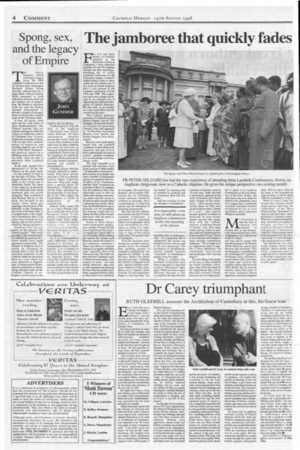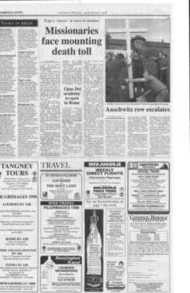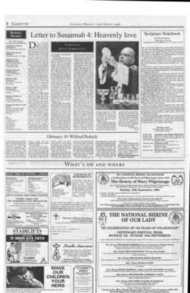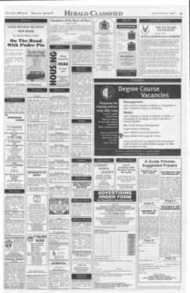Page 4, 14th August 1998
Page 4

Report an error
Noticed an error on this page?If you've noticed an error in this article please click here to report it.
Tags
Share
Related articles
Ordination Of Women Main Lambeth Topic
Relations With Rome Major Topic For Lambeth
Bringing Hope To Counter Materialism
Religious Affairs Grab Limelight
Lambeth Palace Requiem For Pope John
The jamboree that quickly fades
R THE last three weeks, as Catholic chaplain at the University of Kent at Canterbury, I have witnessed the influx of over 750 Anglican bishops and their entourages, attending the 10 yearly Lambeth Conference on the University campus. I sensed a slight feeling of déjà vu: these events are not entirely new to me, as in my former Anglican days I was present at the Lambeth conferences of both 1978 and 1988. This experience gave me a unique advantage in my changed role of supporting the important delegation of Catholic observers, But this time, as an outsider too, I was more able to see the wood from the trees.
The Catholic presence consisted of Cardinal Cassidy, Bishop Duprey and Fr Tim Gallagan, all from the Pontifical Council for promoting Christian Unity, ably supported by Archbishop Alexander Brunett from Seattle and Bishop Pargeter from Birmingham.
Because most participants attend only one Lambeth conference in their lifetime the organisers and spin doctors have a phenomenal amount of control — perhaps manipulation would perhaps not be too strong a word.
The daily timetable is so packed with activities, from group sessions to Bible studies — all admirable in themselves that it ensures most people only meet a handful of participants and do not experience the overall effect of the Conference until the "final" resolutions are presented to them. So managed was the conference that it was impossible even to find out where other bishops were staying unless one had access to the photocopied samizdat sheet containing such details. Similarly. the Establishment was so paranoid over the possibility that bishops might talk too openly that they tried to restrict interviews with the press to those they arranged.
Aware of these tactics, certain traditionalist organisations. notably Forward in Faith from England and the American Anglican Council had set up well-staffed offices working just outside the campus (and therefore outside the control of the conference organisers.) These were able to co-ordinate bishops in sympathy with their aims, especially those from Africa and Asia. The result was that when the Conference came to debate homosexuality, to the surprise of many not least outside observers they were so well organised and informed that they beat the usually much better-organised liberals lobby at what used to be considered
its own game. The result was a dramatic and powerful affirmation that for Christians sexual relations should be confined to marriage. and a condemnation of same-sex unions and the ordination of practising homosexuals.
But what did this affirmation actually amount to? Every Lambeth Conference is governed in its long-term effects by two principles which in the end neutralise any resolution. no matter how apparently decisive. The first principle is that of Provincial Autonomy. The second is that of Ambiguity .
Even the document introducing the resolution process printed clearly the reminder that anything passed at Lambeth is emphatically "not legislatively binding" on any Province. History has shown that every province — including the Church of England in the past — ignores Lambeth conferences whenever it feels expedient to do so. Already, voices from the US and Canada have begun to state that they "are
not bound" by anything said at Lambeth by anything said at Canterbury these last few weeks.
And the wording of even the strongest of resolutions — including that on homosexuality — is so purposely full of ambiguities that anyone can interpret it in his own way and to his own advantage. The resolution of Ecumenism, indeed, actually endorses "anomalies" as constituting a quality in its own right.
When I compare this Lambeth Conference with those in the past it is clear that a kind of "drift process" takes place. What was once a major difficulty becomes a fait accompli by the time the next Lambeth Conference meets in to years time. Sadly, this drift is particularly apparent in the areas of doctrine and Church unity. Despite all the resolutions — often passed unanimously (those on Unity were passed without either a debate or a vote) — they quickly become ignored or treated as irrelevant. In such circumstances one can only sympathise with the Catholic observer, Archbishop Brunets of Seattle. who after three weeks among Anglican bishops could no comprehend how it was possible for any Church to be so diverse and contain so many mutually contradictory tendencies. 'We no longer have an Anglicanism which is capable of clear definition," he commented, "how do you pursue dialogue with a moving target?"
If God willing, I am present in 10 years at what would be my fourth Lambeth conference, what will be the nature of the Anglicanism that will by then have evolved? Clearly, even now, it is no longer possi
ble to speak of an Anglican Communion in the true meaning of the term. Rather, the most that it can now claim for itself is to be a federation, since it no longer has a commonly accepted ordained ministry recognised by all, or even agreement about minimum liturgical standards.
McY PROGNOSIS iS that this lack of cohesion will
ontinue to develop and. as was dramatically demonstrated last week. Anglicanism's loci will become based in Africa
and Asia and no longer with that liberal rump of the Western World which has caused such division and acrimony. This development is something that the Archbishop of Canterbury, Dr George Carey, will have to come to terms with. Last week. he spoke and voted for the majority which came from the Third World. But he must be uneasily aware that much of the most vociferous liberal opposition came from England itself. Will he repeat what he has done on the inematicnal stage at home, or wil he speak with two contradictory voices?
What is clear i that he fissure that existsin world Anglicanism betveen the "orthodoxy" of tie Third World and the "libenlism• of America and the tomer wlite dominions is boundto
When this is acknossledgedby those involved in eumeniial dialogue, not !eat by the Anglican Roman Catholic International Conmi ssian ()WIC), it trufst suety real It in the recognition the R i
impossible to havedialogue with Anglicanism aia whole.
Has not the time low cone for the Catholic Cbirch to be realistic, and to deride wth which component part of Anglicanism it is most fruitul to develop ecumencal reations, and unashamelly to Jo so with vigour?
blog comments powered by Disqus











